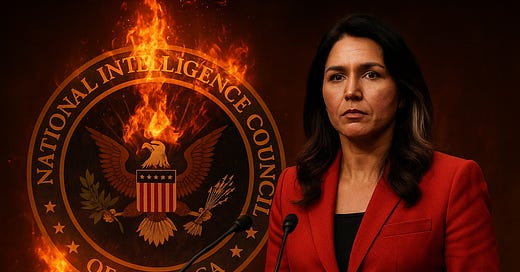“And Ye Shall Know the Truth”: Intelligence, Integrity, and the Tren de Aragua Assessment
An Intelligence Officer Reflects on the IC Assessment That Contradicts the Trump Position
What message, Allen Dulles once wondered, should adorn the foyer of the CIA's headquarters—a $46 million modernist monument to American espionage that opened in Langley, Virginia, in 1961? He settled on a single line from the Bible, now carved into the white Vermont marble of the main hall:
“And ye shall know the truth, and the truth shall make you free.” — John VIII:32
As a young CIA officer, I always took that to heart. It gave me comfort. My job, as I understood it—and as most of us understood it—wasn't to make policy or manipulate narratives. It was to find the truth. To collect what could be known, to analyze it without fear or favor, and to report it with clarity so that policymakers could act on something solid. The mission was simple: tell the truth, even when it's inconvenient.
In recent weeks, that principle was put to the test—and, thankfully, held.
The Intelligence Assessment and Its Findings
In April 2025, the National Intelligence Council (NIC) produced a six-page assessment titled “Venezuela: Examining Regime Ties to Tren de Aragua.” This report, reflecting the consensus of 17 out of 18 U.S. intelligence agencies, concluded:
“While Venezuela's permissive environment enables TDA to operate, the Maduro regime probably does not have a policy of cooperating with TDA and is not directing TDA movement to and operations in the United States.”
This directly contradicts President Trump's claims that the Venezuelan government was orchestrating an "invasion" of the U.S. via the gang.
The assessment further noted:
“We assess that the presence of Tren de Aragua members in the U.S. is the result of self-directed migration, not foreign government action.”
Only the FBI partially dissented, suggesting a few Venezuelan officials might be assisting TDA members' entry into the U.S., but without evidence of a coordinated effort. And the rest of the IC disagreed.
The Unusual Path to Declassification
The NIC assessment — “Venezuela: Examining Regime Ties to Tren de Aragua” — was finalized on April 7, 2025. It was a product of his own intelligence community, developed under his administration. And yet, it directly contradicted a core narrative that Trump and his allies have used to justify increasingly aggressive immigration rhetoric and enforcement: the claim that Nicolás Maduro’s regime is deliberately sending violent gang members into the United States.
So — the content of the report is interesting. But what makes this even more interesting is not just the content — but how it became public.
Under normal circumstances, such requests often result in heavily redacted documents or outright denials, citing national security exemptions. The full release of the six-page National Intelligence Council (NIC) assessment on Venezuela and Tren de Aragua is indeed atypical.
This unusual transparency raises important questions: Was this an intentional move by career officials to ensure the public had access to information contradicting the administration's narrative? Or was it a procedural anomaly? While we can't definitively answer these questions, the full declassification suggests a deliberate choice to uphold the principle of transparency.
For those interested, the full unclassified assessment is available here: National Intelligence Council Assessment on Venezuela and Tren de Aragua.
It’s also worth noting that shortly after the release, the New York Times reported that a senior Trump official had tried to pressure at least one analyst to revise the report’s conclusion. The analyst refused.
And the report, as released, stood firm:
“We assess that the presence of Tren de Aragua members in the U.S. is the result of self-directed migration, not foreign government action.”
— NIC Assessment, April 2025
That’s the truth the FOIA process brought into daylight. Whether it was a quiet act of institutional defiance or an unusual moment of transparency, the outcome is the same: the narrative is now in tension with the facts — and the facts won, at least in this case.
Consequences: Gabbard Fires NIC Officials After Assessment Contradicts Trump
Holding to the truth is not always easy, and not without risks. In this situation, a price was paid. National Intelligence Director Tulsi Gabbard fired two senior officials from the National Intelligence Council (NIC)—Michael Collins and Maria Langan-Riekhof—after the NIC released the assessment contradicting the Trump position.
The firings highlight the brazen politicization of the IC, with Jonathan Panikoff, a former deputy national intelligence officer, warning that the NIC is "the heartbeat of apolitical U.S. all-source analysis." Gabbard’s purge appears to send a message: independent analysis that conflicts with administration policy will not be tolerated. This is significant. It makes clear that the IC is under pressure not just to remain silent—but to actively conform. This is not how it’s supposed to work. I don’t envy the intelligence professionals caught up in this; I hope they hold the line on Truth.
Conclusion
The inscription at the CIA's entrance serves as a guiding principle: to seek and report the truth. The Tren de Aragua assessment exemplifies this commitment, standing firm against political pressure and ensuring that policy decisions are informed by accurate intelligence. It would be naive to think that the system always holds, and that truth always prevailsm but here it did, and that’s a good thing.
For those interested, the full unclassified assessment is available here: National Intelligence Council Assessment on Venezuela and Tren de Aragua





I commend my father's personal take on that passage from John: "For ye shall know the truth, and the truth shall piss ye off." That concludes today's readings from the Gospels as understood by Frank Smith.
I'm guessing that if Tulsi fired people, the document was accidentally released.